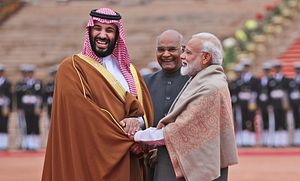On September 24, Turkey’s President Recep Tayyip Erdogan, while speaking at the United Nations General Assembly (UNGA), raised the issue of Kashmir. Before his speech at the UNGA, Erdogan had met with the Prime Minister of Pakistan Imran Khan on the sidelines. On August 5, India abrogated Article 370 which gave special status to the state of Jammu and Kashmir. This action attracted criticism from Pakistan, but India received support from a number of countries including Saudi Arabia and the United Arab Emirates. Turkey, on the other hand, has supported Pakistan on the Kashmir issue as illustrated by Erdogan’s remarks.
The countries supporting India have endorsed India’s position that Kashmir is an internal Indian matter. Pakistan has tried to garner support from the international community over the issue of Kashmir. Most countries, however, have shied away from supporting Pakistan’s position. Turkey is one of the few countries to support Pakistan. However, in doing so Turkey drew the attention of India.
India’s Response to Turkey
Since Erdogan came out in support of Pakistan, India has taken a number of steps to counter Turkey. One of India’s first responses was during the UNGA as well. After Erdogan raised the Kashmir issue, Indian Prime Minister Narendra Modi met with the leaders of Cyprus, Armenia and Greece. Cyprus and Greece have territorial disputes with Turkey, while Armenia considers Turkey responsible for the genocide of millions of Armenians in 1915. During these meetings India extended its supports to the respective stands of these three countries against Turkey.
Another step from India is its criticism of Turkey’s offensive action against the Kurds in Syria. On October 9, Turkish forces launched an attack against the Kurds in northeast Syria, creating what it calls a “safe zone.” India condemned the attack and called upon Turkey to exercise restraint.
A third step taken by India is the cancellation of Modi’s scheduled visit to Turkey that was to take place toward the end of October. The visit was to precede Modi’s visit to Saudi Arabia from October 29 to 31.
A fourth step that India has taken is the downsizing of defense ties with Turkey. In the view of growing defense ties between Turkey and Pakistan, India is reducing its export of arms to Turkey.
Apart from these measures, the Indian government issued a travel advisory to its citizens to exercise caution while travelling to Turkey.
India’s Diversifying Middle East Ties
Two factors have played an important role in India’s relations with Middle Eastern countries: economics and India’s internal politics. The economic factor is centered on the oil trade and remittances from the sizable Indian diaspora in the Middle East. The second factor is India’s internal politics with regard to its own large Muslim population. Relations with Middle Eastern countries have often been considered as levers to appease Indian Muslims.
Over a period of time, however, India has diversified its relations beyond these factors. Especially in the case of Saudi Arabia. India has been developing a strategic partnership with the Saudis over the past few years. Bilateral visits between the countries have taken place regularly. Modi visited Saudi Arabia in 2016; Saudi Arabia’s Crown Prince Mohammed bin Salman visited India in February 2019 and as noted above, Modi will visit the Kingdom next week. During the February visit, India and Saudi Arabia reached an agreement to set up a Strategic Partnership Council. Recently India and Saudi Arabia agreed to increase cooperation on counterterrorism. Overall India’s progression in relations with Saudi Arabia highlights that the areas of cooperation between India and the countries of the Middle East have expanded. More areas of cooperation not only strengthen bilateral relations but they also allow India to play a greater role in that region.
Challenges for India
The politics of the Middle East are complex and multidimensional. The Saudi Arabia-Turkey rivalry is one of the dimensions. Another dimension is the Saudi Arabia-Iran rivalry. India has close relations with both Saudi Arabia and Iran. However, India is yet to work out a way to balance its ties with Iran on the one hand and Saudi Arabia and the United States on the other. Iran is strategically important for India, but India-Iran relations also need the diplomatic backing and power that India has at the moment put behind growing its relations with Saudi Arabia. In stepping up its diplomatic offensive against Turkey and by actually giving preference to Saudi Arabia, India is signaling that it may be ready to take sides. Although India has a long way to go, the recent steps indicate that India is looking to redefine its role in Middle Eastern politics.
Niranjan Marjani is an independent journalist based in Vadodara, India. He is on Twitter @NiranjanMarjani













